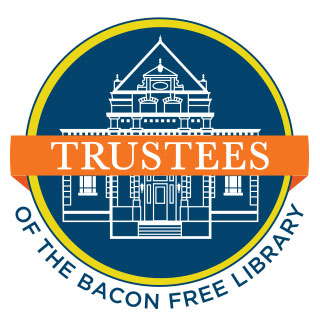Author: cstirling
Finding Joy in the Mud
FINDING JOY IN THE MUD
By Martha E. Fagan, RN, BSN
I was feeling a bit sluggish and tired on this Sunday morning after another week of our ‘new normal’ and the never-ending “Breaking News” cycle. Thank goodness I have many sources of good news in my email inbox each day to add balance to my perspective. Today’s reading was exceptionally good.
I subscribe to the 10% HAPPIER app which is a resource for meditation and offers podcasts and writings on the topic of happiness and well-being. Today’s newsletter led with an article No Mud, No Lotus by Yael Shy. It’s opening paragraph stayed with me all day…” The lotus flower, a symbol of awakening in Buddhist and other spiritual traditions, blooms in the muckiest, muddiest swamps. Its roots begin under the swamp water and its buds reach their way to the surface where they burst forth into stunning pink or white flowers. If you want the beauty of the lotus flower, there is no getting around the mud.”
We are still thick in the mud of this pandemic! We desperately need the beauty of the lotus to brighten our days and lift our spirits. Our job is to find (create?) our lotus, to find our joy.
Joy is one of 10 positive emotions identified by Dr. Barbara Fredrickson, a professor of psychology at the University of North Carolina at Chapel Hill, a researcher and author in the field of Positive Psychology. In her book Positivity, Dr. Fredrickson describes how experiencing positive emotions raises our positivity level and expands or broadens our awareness and attention…we can then build on this perspective.
She describes joy as, “Your surroundings are safe and familiar. Things are going your way—even better than expected. At the moment the situation requires little effort on your part. These are circumstances that spark joy. And, there are many other sources as well. Perhaps co-workers surprised you with a birthday party. Or you open a letter to find an unexpected bonus. Or you’re out to dinner with new friends and delighting in their good company. Joy feels bright and light. Colors seem more vivid. There’s a spring in your step. And your face lights up with a smile and an inner glow. You feel like taking it all in. You feel playful—you want to jump in and get involved.”
I describe joy as the bubbles in champagne, making a good thing even better.
You may be reading this and thinking “That is so far from the truth right now! Life is hard and not going my way. Everything I’m doing is an effort, and there’s no end in sight. I’m happy to get through my day…how can I feel playful?”
These thoughts and the feelings they elicit are true AND so is the fact that there are many things, simple things, that can bring moments of joy…even in the muddiness of today. Remember, I’m talking small, simple pleasures that trigger feelings of momentary contentment. Little joy-filled moments are a way to boost our mood and help offset the flood of negativity surrounding us right now.
Mary Oliver, my favorite poet, in her poem Mindful, reminds us to look for what the day has to offer…
Mindful
Every day
I see or hear
something
that more or less
kills me
with delight,
that leaves me
like a needle
in the haystack
of light.
It is what I was born for—
to look, to listen,
to lose myself
inside this soft world—
to instruct myself
over and over
in joy,
and acclamation.
Nor am I talking
about the exceptional,
the fearful, the dreadful,
the very extravagant—
but of the ordinary,
the common, the very drab,
the daily presentations.
Oh, good scholar,
I say to myself,
How can you help
but grow wise
with such teachings
as these—
the untrimmable light
of the world,
the ocean’s shine,
the prayers that are made
out of grass?
When we feel joy our body responds by releasing dopamine and serotonin, two types of neurotransmitters in the brain. Both of these chemicals are associated with feelings of happiness. So, when something you perceive as happy occurs, your brain receives the signal to release these chemicals into your central nervous system. If this is how it works, can we trick our brains into releasing these chemicals to increase our feelings of wellbeing? “In a way you can”, says Diana Samuel, MD, an assistant professor of clinical psychiatry at Columbia University Medical Center. She explains, “Smiling can trick your brain by elevating your mood, lowering your heart rate, and reducing your stress. The smile doesn’t have to be based on real emotion because faking it works as well.”
During the height of the COVID19 crisis in NYC, Lenox Hill Hospital played the Beatles song Here Comes the Sun over the public address system every time a coronavirus patient was discharged or recovered enough to breathe off the ventilator. The song made the over-stressed, exhausted frontline workers smile and feel good for the moment. The times when we are feeling the worst is the exact time we need to pursue things that make us smile and feel happier. According to Laurie Santos, a professor of psychology at Yale University pursuing happiness and, more importantly, finding it, matters more during dark times. In a recent article in AARP magazine (June/July 2020) she says, “Happiness gives us the resilience to get through. This is a challenging time because it’s both a physical and mental health crisis. We need to focus on happiness more now, not less.”
Doing something that feels like play to you is a great catalyst for joy. Take a hike, go for a swim, throw a ZOOM party, create a ‘happy song’ playlist and sing out loud or dance to your favorite songs, or paint a picture. Play also encourages exploration, which is the base for knowledge and personal growth. Play looks different for each individual, so learn what feels most playful to you and schedule time doing it.
This article When Savoring a Pleasant Moment Is a Radical Act in The Daily Good: News that Inspires, reminds us of the necessity to nurture ourselves now by seeking joy in the darkest of times. This is just the time to seek out something that will make your heart sing and bring a smile. We can’t fast forward out of this, we will get through this, and we need to make our own best days.
Martha Fagan is the Vice Chair of the Bacon Free Library. She may be reached through her email at mefagan.bfl@gmail.com
Staff Pick: Movie of the Week
The Power of Our Breath
The Power of Our Breath
By Martha Fagan, RN, BSN
It’s August and we’re still deeply entrenched in learning to live with this pandemic. Back in March this would have seemed unbelievable… yet here we are.
One thing I’ve told myself many times during these past months is “Take a deep breath.” I’ve also given this sage advice to those I love… though I admit there are times I only get a sigh and an “eye roll” response. In spite of these reactions I’ll continue suggesting “take a deep breath”, because the power of our breath is quite remarkable and powerful! Deep focused breathing can transform the stress response (fight or flight) to the relaxation response.
A July 2020 Harvard Health Publishing article entitled Relaxation techniques: Breath control helps quell errant stress response cites the benefits of deep breathing as a way to shift away from the stress response. The article says, “The stress response suppresses the immune system, increasing susceptibility to colds and other illnesses. Moreover, the buildup of stress can contribute to anxiety and depression.” We can’t avoid all sources of stress in our lives, especially now as we’re constantly adjusting our daily routines and continually processing new information. What we can do is look for healthier ways of responding to our stress, which will in turn help us to boost our immune system during this pandemic.
The article continues, “One way (to respond in a healthier way) is to invoke the relaxation response, through a technique first developed in the 1970s at Harvard Medical School by cardiologist Dr. Herbert Benson. The relaxation response is a state of profound rest that can be elicited in many ways, including meditation, yoga, and progressive muscle relaxation. Breath focus is a common feature of several techniques that evoke the relaxation response. The first step is learning to breathe deeply.”
Many people are not consciously aware of how they’re breathing or the difference between shallow and deep breaths. Shallow breathing limits the diaphragm’s range of motion, so the lowest part of the lungs doesn’t get a full share of oxygenated air. That can make you feel short of breath and anxious. Deep breathing brings full oxygen exchange resulting in slowing the heart rate and often lowering blood pressure as well, in addition to eliciting a sense of calmness. There is no magic in deep breathing though it does take some practice.
There are many books and reference articles written on the subject of the connection between our breath and our nervous system and there are also many different techniques to regulate our breath. I want to share with you a book that tells a wonderful story and teaches a unique breath technique.
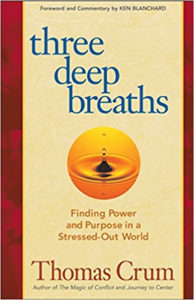 Sometimes a very small book delivers a very big teaching, and in his book Three Deep Breaths: Finding Power and Purpose in a Stressed-Out World Thomas Crum accomplishes just that.
Sometimes a very small book delivers a very big teaching, and in his book Three Deep Breaths: Finding Power and Purpose in a Stressed-Out World Thomas Crum accomplishes just that.
Meet Angus, the book’s relatable hero. He is a stressed out, harried businessman constantly feeling behind the eight ball and searching elusively for his work/life balance. Through often-humorous encounters along the way he is exposed to the deceptively simple, extraordinarily effective Three Deep Breath technique.
Crum writes, “Science has shown us that there are three “C’s” of a stress resistant immune system:
- A sense of CONTROL over your response to life events
- A sense of COMMITTMENT to something beyond your ego (i.e., family, service, religion, or life purpose).
- A sense of CHALLENGE and learning opportunity when confronted with a stressor.
“The Three Deep Breaths technique is a mind-body process which allows us to achieve the three C’s while balancing our autonomic nervous system through the breath.”
Breath # 1: The Centering Breath
Breathe in the present moment, with balance and energy
Breath # 2: The Possibility Breath
Breathe in the “me I want to be” with power and purpose
Breath # 3: The Discovery Breath
Breathe in the mystery, let go of judgment
The Centering Breath gives us the calm and balance we need to respond appropriately rather than react negatively in stressful situations.
The Possibility Breath reminds us of a purpose higher than our egos.
The Discovery Breath turns a stressful situation into a crucial learning opportunity.
Spoiler Alert…
Angus finds a way to find a sense of calm in the midst of chaos and turn his stress into positive energy. That’s why he’s the book’s hero!
And the best news—the book is delightfully lighthearted while delivering a powerful message.
So, whether you choose to read the book or not, my hope is you will begin to notice your breathing and find the time to stop and take a deep breath to re-center and respond when feeling anxious or overwhelmed.
Sometimes the simplest step can be a game changer.
So, let your belly go and BREATHE!
Martha Fagan is the Vice Chair of the Bacon Free Library. She may be reached through her email at mefagan.bfl@gmail.com
Staff Pick: Movie of the Week
Staff Pick: Movie of the Week
Staff Pick: Howards End
Casey’s Pick: Howards End

Published in 1910, E.M. Forster’s novel Howards End is a classic novel that still feels fresh today. The story follows three families from different classes and backgrounds in early 1900s England. When the wealthy Ruth Wilcox impulsively decides to leave her country home to her new younger friend Margaret Schlegel, she sets off a chain of events that will bring the families into each others’ lives. I love the writing of E.M. Forster, and Howards End, along with his novel A Room with a View, are two of my favorite books. You can request the book, borrow the ebook, or borrow the digital audiobook.

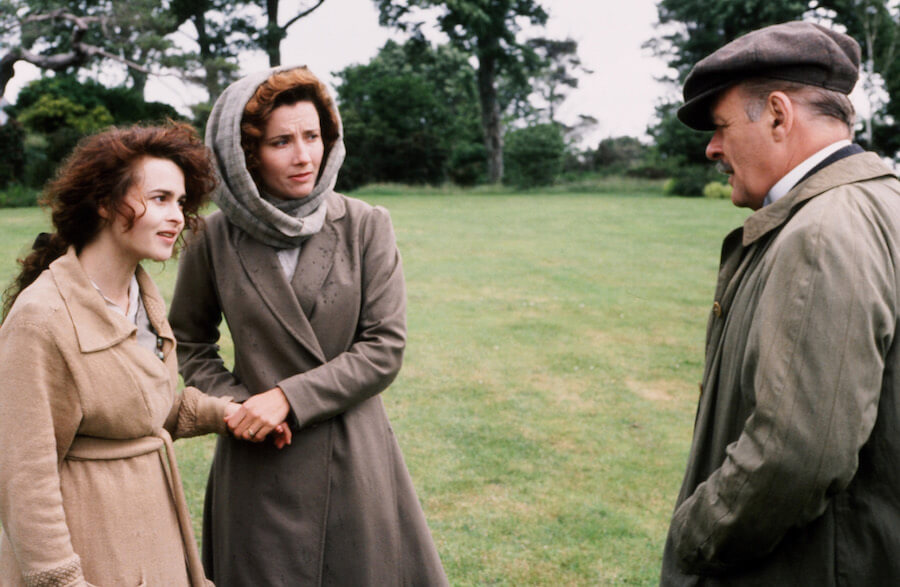
Howards End was adapted into an Oscar-winning film in 1992, starring Emma Thompson, Anthony Hopkins, Vanessa Redgrave, and Helena Bonham Carter. Stream the film on Kanopy. It was also adapted into a BBC/Starz miniseries in 2007 featuring Hayley Atwell and Matthew Macfadyen; request the DVD.

If you’re still looking for more Howards End, try Zadie Smith’s novel On Beauty, which was inspired by Forster’s book and updated to contemporary settings in Massachusetts and England. Request the book or borrow the ebook.
Life Re-Imagined
LIFE RE-IMAGINED
By Martha Fagan, RN, BSN
The weekend of August 8th-9th, 2020 should be my 25th year riding in the Pan Mass Challenge (PMC), a charity bike event that raises funds to support cancer research at the Dana Farber Cancer Institute.
Sadly, COVID19 caused the ride to be cancelled, as it’s impossible to safely distance 5000+ riders over two-days of group rest stops and dormitory sleeping accommodations.
The reality is…COVID stopped the ride but cancer isn’t taking a year off! And, neither are we.
Together with my husband Don I’ve been riding since 1996. The PMC’s motto is “Commit—You’ll Figure It Out” and up to now we always have… juggling to fit in our training rides, struggling to meet our commitment goals and navigating the weekend’s logistics. Those challenges now seem so simple.
This year is forcing us to re-imagine how we will still fund raise and ‘ride’ as not doing so isn’t an option for us. The PMC is one of our shared passions. Our combined creativity, flexibility and resourcefulness to re-imagine our weekend helped us figure it out.
We sent out our pleas for support as we do each year knowing this year there are a plethora of other charities needing funds. Next we determined how to ride safely in solidarity for the cause. We plan on doing a long ride together, long enough to be challenging, though not the 100 miles we would usually ride each day of the PMC. We’ll miss the energy of riding en-masse with our fellow PMCer’s and the cheering of folks gathered by the side of the road, both of which always to serve to keep us motivated to keep pedaling no matter what.
This year is dramatically different AND we’re grateful to be able to ride. It’s our way of honoring the memory of those we’ve lost to cancer and celebrating those survivors living their lives with cancer’s imprint upon them. And this year as we ride we’ll remember the best of the past years and cheers to keep us pedaling.
I’m sharing this story because the PMC is one small example of how we must find ways daily to adapt to the limitations and changes brought on by this pandemic. Summer activities are limited, family gatherings are now choreographed for social distancing, summer camps are closed, stadium stands are empty, and school’s resumption this fall is tenuous at best leaving many parents at a loss for child care.
We are seeing firsthand that what we perceived as life’s certainties is not certain at all, rather quite fragile. To quote Rick Hanson, PhD, psychologist and best selling author on the subject of well-being, “Life is like a house of cards, a single gust of wind — a layoff at work, an injury, a misjudgment, a bit of bad luck – can knock it over.” A pandemic blows the cards all over the place!
We witness human being’s resilience time and again as people overcome obstacles that seem insurmountable. Resiliency is key to not only surviving but also thriving. However, in order to foster our resilience we must first acknowledge our fragility.
Rick Hanson goes on to say, “If we don’t recognize fragility, we’ll miss chances to protect and nurture so many things that matter, and we’ll be needlessly surprised and upset when things do inevitably fall apart. We need to embrace fragility – to see it clearly and take it into our arms – to be grounded in truth, peaceful amidst life’s changes and endings, and resourceful in our stewardship of the things we care about…
Ultimately, try to come to peace with the inevitable: all things fall apart, one way or another. Everything cracks. And yet there is something so beautiful about this part of the truth, as Leonard Cohen says much more eloquently than I can:
Ring the bells that still can ring
Forget your perfect offering
There is a crack in everything
That’s how the light gets in
That’s how the light gets in”
We have so many cracks right now inside our families, our communities, our nation and ourselves. Amidst this pain and brokenness lies our opportunity to re-frame and re-imagine how to piece things back together. Our fragility forces us to be courageous as we strive to embrace new ways of functioning to reclaim our lives in whatever way we’re able. Right now it’s hard to see the light in the cracks AND it’s there, however subtle currently.
So in two weeks Don and I will ride our version of the 2020 PMC hoping to still have a meaningful and positive impact on the road to finding a cure for cancer. Figuring out how to do this was easy…figuring out how to bring re-imagining to other facets of our life is more of a challenge. As we choose our next steps we’ll need all the tools I’ve written about these past months—curiosity, self-compassion, courage, gratitude, hope, character strengths and mindfulness—to help guide us in the right direction.
Commit…You’ll Figure It Out.
Martha Fagan is the Vice Chair of the Bacon Free Library. She may be reached through her email at mefagan.bfl@gmail.com
Travel the World in Books
Summer is typically a time for international trips, but not this year. While we can’t physically travel the globe right now, books can always offer an armchair adventure. Try one of these titles to visit another part of the world:
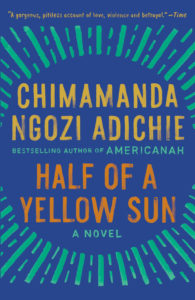
NIGERIA: Half of a Yellow Sun by Chimamanda Ngozi Adichie — request the book or borrow digitally
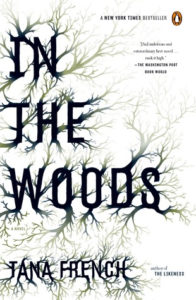
IRELAND: In the Woods by Tana French — request the book or borrow digitally
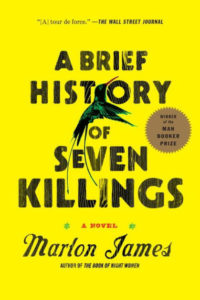
JAMAICA: A Brief History of Seven Killings by Marlon James — request the book or borrow digitally
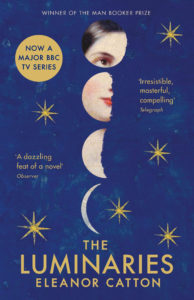
NEW ZEALAND: The Luminaries by Eleanor Catton — request the book or borrow digitally
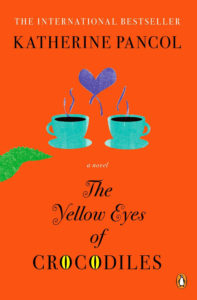
FRANCE: The Yellow Eyes of Crocodiles by Katherine Pancol — request the book or borrow digitally
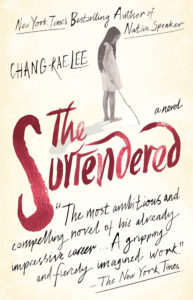
KOREA: The Surrendered by Chang-Rae Lee — request the book or borrow digitally
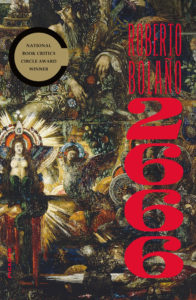
MEXICO: 2666 by Roberto Bolano — request the book or borrow digitally
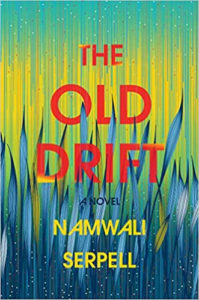
ZAMBIA: The Old Drift by Namwali Serpell — request the book or borrow digitally
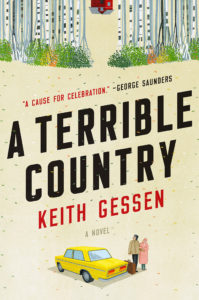
RUSSIA: A Terrible Country by Keith Gessen — request the book or borrow digitally
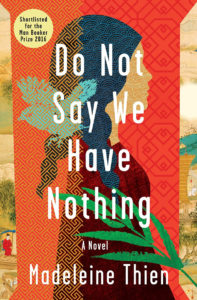
CHINA: Do Not Say We Have Nothing by Madeleine Thien — request the book or borrow digitally
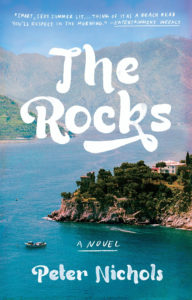
SPAIN: The Rocks by Peter Nichols — request the book or borrow digitally
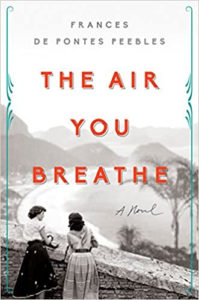
BRAZIL: The Air You Breathe by Frances de Pontes Peebles — request the book or borrow digitally
